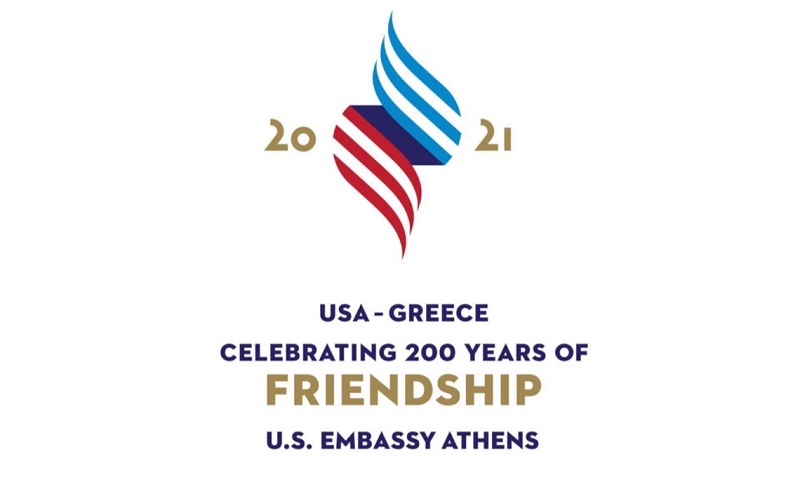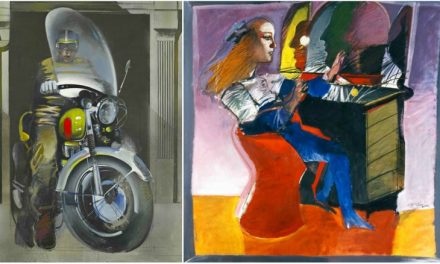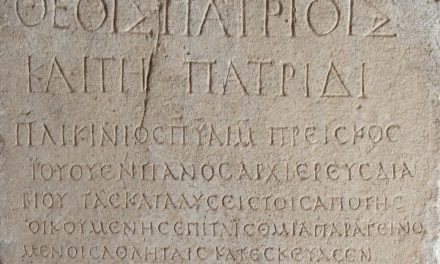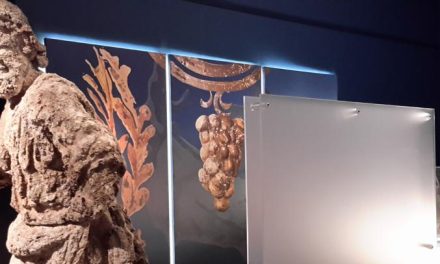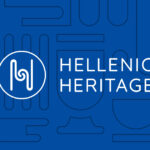“USA & Greece: Celebrating 200 Years of Friendship” is a year-long campaign launched by the US embassy in Greece to commemorate Greece’s 1821 War of Independence highlighting the historic relationship between the two countries as well as their present and future partnership. Through the campaign events, the role that the American Philhellenes played in Greece’s struggle for independence, but also the contribution of the ancient Greek ideals to the founding of the United States will be illustrated. A lesser-known story concerning the impact of the Greek revolution on the abolition of slavery in the US will also be revealed. The USA-GR contemporary strategic partnership regarding education, research and digital technologies is equally celebrated through the campaign. The US embassy will fund several programs throughout 2021, partnering with Greek and American civil society, educational, and arts institutions.
A two-way inspiration
The Athenian Democracy and the classical Greek ideals were clearly an inspiration at the founding of the American Republic playing an important role along with the ideals of the Enlightenment. All of America’s Founding Fathers had studied ancient Greek philosophers’ texts and were familiar with the Greek ideals of democracy and the Rule of Law as well as with the concept of the Greek city-state or polis. Thomas Jefferson (1743-1826), considered the primary author of the Declaration of the American Independence of 1776, was even able to read the Greek classics in their original language.
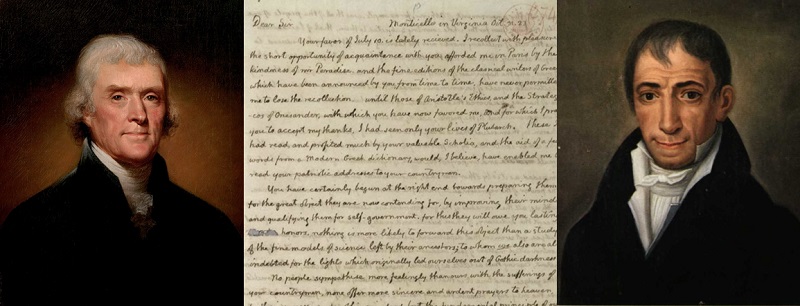
Adamantios Koraes (right) and Thomas Jefferson (left) exchanged letters about the founding of an independent Greek state
On the other hand, the American Independence Declaration along with the French Revolution of 1789 inspired the Greeks that were seeking not only their independence from Ottoman rule but also a chance to clearly define their national identity and found an independent state. The influential Greek intellectual Adamantios Koraes (1748-1833) as he was beginning to envision the Greek state, he exchanged views on the War of Independence and on the Constitution with Thomas Jefferson requesting his advice through a series of letters. Koraes who was a world-renowned classical scholar, had met Jefferson in Paris in the mid 1780s, while the latter was serving as US ambassador in France. The two men shared the belief that people enlightened by education could best govern themselves, and that democracy was better than monarchy. (Horton, A. (1976). Jefferson and Korais: The American Revolution and the Greek Constitution, and Evrigenis, I. (2005). A Founder on Founding: Jefferson’s Advice to Koraes)
The first Greek Constitution that was adopted by the 1st National Assembly in Epidaurus in January 1822, contained the Declaration of the Independence of Greece, a text infused with the democratic and liberal ideas of the American and French Revolutions. The Greek Nation proclaimed “before God and people” its political existence and independence echoing the principles of self-determination and self-government.
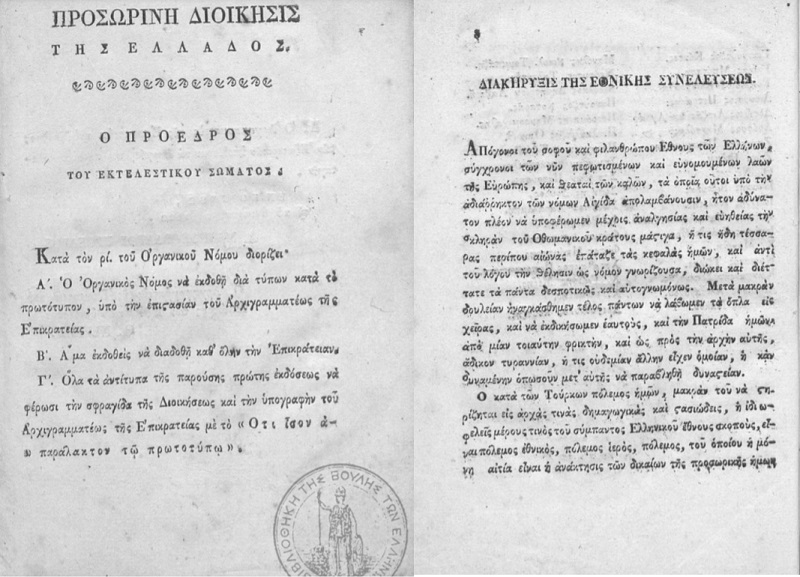
The first Greek Constitution incorporated the Declaration of the Independence of Greece (January 1822)
American Philhellenism
Classical education in America had been a linchpin for the Greek revolutionaries. Koraes’ first appeal to America for recognition and support was to the classicist Edward Everett (1794-1865), who had been appointed as the first Eliot Professor of Greek at Harvard and had spent some years in Greece before taking his post. Everett, who was also the publisher of the North American Review, published every correspondence of letters or appeals that he was receiving from Greece and through articles and speeches he made strong public pronouncements for the recognition of the Revolution and for sending military aid to Greece.
It is not surprising thus, that Greek classical thought and democratic ideals are at the origin of the movement of the American Philhellenism. After the outbreak of the Greek Revolution in 1821, Americans helped to arouse public sentiment and sympathy in favor of Greece, raised money and provisions to aid the cause, and tried to persuade their representatives to recognize Greek Independence. Although the official authorities did not respond to the demand of noteworthy Americans due to the Monroe doctrine of neutrality (December 1823), American Philhellenes as individuals warmly supported the Greek Independence War.
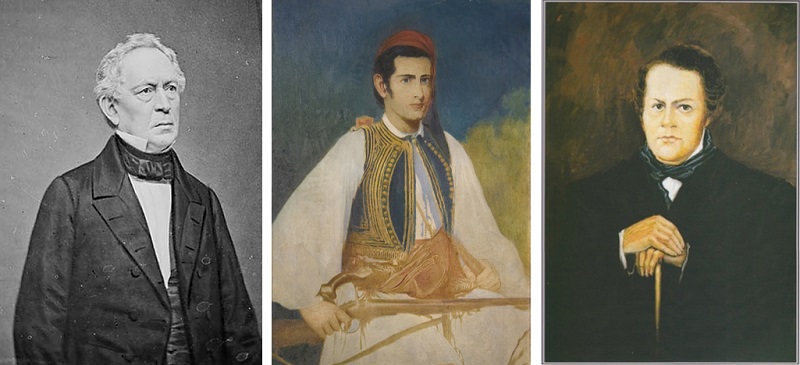
Edward Everett (left), Samuel Gridley Howe painted in the dress of a Greek soldier (center), Jonathan P. Miller (right)
Touched by the horrible massacre of Chios and the death of Lord Byron in Missolonghi, many young Americans joined the Greek revolutionaries. The first volunteer that joined the Greek War was George Jarvis, a New Yorker who came to Greece in 1822 and became known as “Kapetan Zervos”. Jonathan P. Miller of Vermont, arrived in Missolonghi in 1824 and served in Zervos’ regiment. Miller quickly mastered the Greek language, adopted Greek dress and was fearless in battle. Another American Philhellene was Samuel Gridley Howe, a Bostonian physician and abolitionist, who came to Greece after his graduation in 1824, where he served as a soldier and chief surgeon. All three left extensive reports of their activities in Greece.
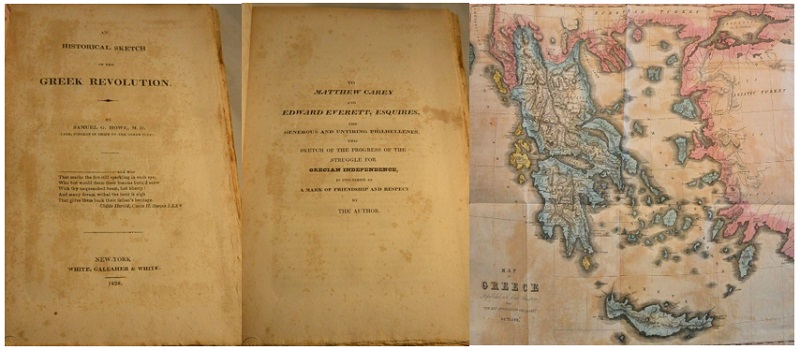
Dr Samuel Howe’s book “Historical Sketch of the Greek Revolution”, first edition (SHP collection)
The campaign events
• The “American Philhellenism” Exhibition at the Museum of Philhellenism: a special exhibition entitled “The American Philhellenism” at the Museum of Philhellenism in Athens, featuring unique artifacts and historical documents capturing the birth and evolution of Philhellenism, US support for the Greek Revolution, and the impact of Greek cuulture on the values, institutions, artistic and architectural expressions in the US. The Museum on Philhellenism is founded by the Society for Hellenism and Philhellenism (SHP) in cooperation with the Prefecture of Attica with the aim to explain the birth and evolution of Philhellenism but also explore and build relations of friendship and cooperation launching a new Philhellenic movement of the 21st century.
• Exhibition “The Free and the Brave: American Philhellenes and the Glorious Struggle of the Greeks (1776-1866):” at the Gennadius Library, American School of Classical Studies at Athens, this will be an exhibition exploring the movement of Philhellenism that flourished in the U.S. in the 19th Century, influenced by Greek classical thought and democratic ideals. The exhibition, that will also be available online, is based on rare archival materials from the Gennadius Library as well as paintings and philhellenic objects from museums and private collections in Greece. Emphasis also is given to a little-known topic: the role Greek emancipation played in the progress toward the abolition of slavery in the United States. As the medieval art historian and Director of the Gennadius Library Maria Georgopoulou explains in an article at Fulbright-Greece “by highlighting the impact of one of the most famous statues by an American sculptor (Hiram Powers’s The Greek Slave), the exhibit seeks to enlighten viewers about the empathetic connection between Greek victims of Ottoman oppression and African slaves in America”.
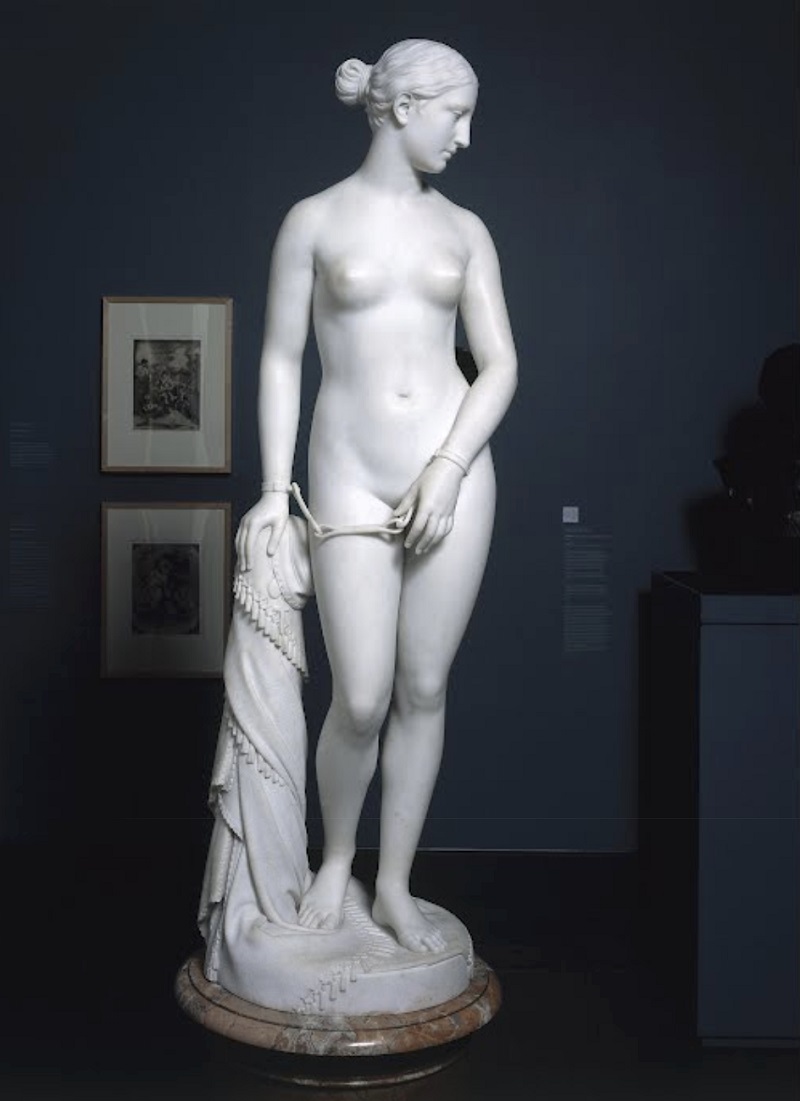
Hiram Powers, The Greek Slave, 1869, marble, (The Brooklyn Museum) – The Greek emancipation played an important role toward the abolition of slavery in the US
• American Studies: scholarships towards the establishment of an American Studies curriculum at a Greek university.
• “Greek Fire”: a seminar at the Delphi Economic Forum and online report on the lasting impact that the Greek Revolution has had on American culture andpolitics.
• Virtual Entrepreneurship Project “Connect the Dots”: a virtual entrepreneurship mentoring program conducted in partnership with The Hellenic Initiative (THI), this program will provide online mentorship by U.S. business leaders to Greek entrepreneurs. This program is placed under the auspices of the “Greece 2021” Committee.
• Athens Science Festival 2021 – 200 Years of Innovation: an experiential space will be created, comprising multiple exhibits that refer to the historical anniversary and the evolution of the Greek state, highlighting areas of shared scientific excellence with the U.S. and featuring prominent American speakers. This program is placed under the auspices of the “Greece 2021” Committee.
• Greek National Opera, Stavros Niarchos Hall: the Greek National Opera will present two special musical performances of works reflecting the shared values of the U.S. and Greece.
• City of Sparta: Sparta will host a conference on American Philhellenes and conduct a range of programs throughout 2021 to commemorate the bicentennial.
• U.S. Consulate General Thessaloniki: the creation of an exhibit that chronicles the history of the Consulate General and the U.S. presence in Thessaloniki.
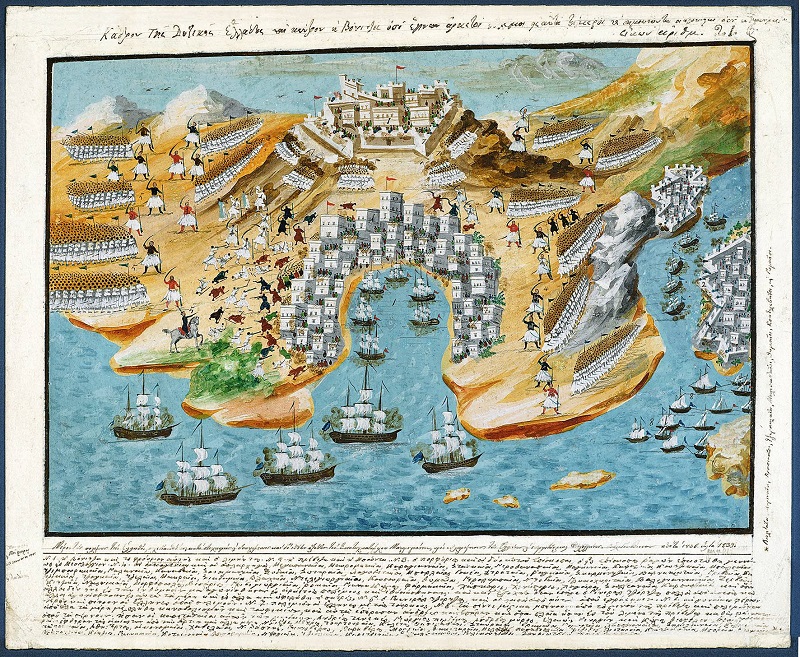
Battle in western Greece, watercolor, Dimitrios Zographos (Gennadius Library, American School of Classical Studies at Athens)
Read also via Greek News Agenda:
“Greece 2021″ | The celebrations for the 200th anniversary of the country’s Independence War
American and British Philhellenes
The Greek Revolution today: historiography and the public on the eve of 2021
The visual representation of the 1821 Greek War of Independence through the eyes of Greek and foreign artists
Greek Independence Day: 25 March, 1821 | The Making of a Modern European State
I.E.

